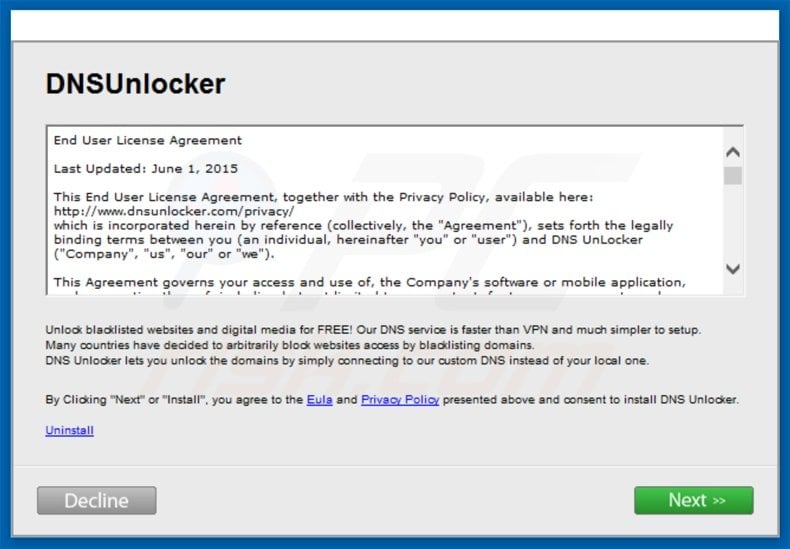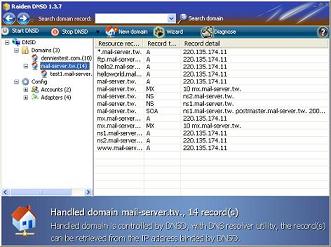Dns Server Software Free
- Dns Server Software Free Download
- Dns Server Software Free Download For Windows 7
- Windows Dns Server Program
- Dns Server Software For Windows
- Dns Server Software Free Pc
Apr 06, 2012 Free DNS Server Software. You can use the following software on Linux / UNIX, Mac OS X, or MS-Windows server system to setup your own DNS servers. The following are free dns server and recommend by me for ease of use and security features. All of the following dns software are free for commercial or personal use. Windows dns server Software - Free Download windows dns server - Top 4 Download - Top4Download.com offers free software downloads for Windows, Mac, iOS and Android computers and mobile devices. Visit for free, full and secured software’s. Dynamic Free DNS Free Vyoufinder Software Company Webware, Windows 2000, Windows 2003, Windows 7, Windows 98, Windows Me, Windows NT, Windows Server 2008, Windows Vista Version 1.1 Full Specs.
I'm looking for a free (GPL or BSD) and lightweight DNS server that runs on Windows, which I can use as a server for my coLinux installation, which, when configured via slirp, always gets the Windows server as it's only DHCP-assigned DNS server (I can't hardcode it in colinux as something like 4.2.2.3, since I often travel to places where outgoing DNS is blocked, and I want whatever rules are configured in Windows to be used for the linux process as well).
Bonus points [virtual points, that is..] for something that's portable.
MikeageMikeage3 Answers
As an alternative, you might consider setting up a lightweight linux distro as a virtual machine under VirtualBox or similar.
Unbound. It is by far the easiest to setup on Windows. Just download and run the installer and you're done. Uses less than 8Mb of memory on my server, much less than Microsoft DNS.
Have a look on Wikipedia there are quite a few to go at: http://en.wikipedia.org/wiki/Comparison_of_DNS_server_software
I Vote for bind as it has web management.
Not the answer you're looking for? Browse other questions tagged windowsdomain-name-system or ask your own question.
DNS servers translate the friendly domain name you enter into a browser (like lifewire.com) into the public IP address that's needed for your device to actually communicate with that site.
Your ISP automatically assigns DNS servers when your smartphone or router connects to the internet but you don't have to use those. There are lots of reasons you might want to try alternative ones (we get into many of them in Why Use Different DNS Servers? a bit further down the page) but privacy and speed are two big wins you could see from switching.
The best free public DNS servers include Google, Quad9, OpenDNS, Cloudflare, CleanBrowsing, Verisign, Alternate DNS, and AdGuard DNS.
Here's a quick reference if you know what you're doing but we get into these services a lot more in the next section:
A list of additional free DNS servers can be found in the table near the bottom of the page.
Primary DNS servers are sometimes called preferred DNS servers and secondary DNS servers sometimes alternate DNS servers. Primary and secondary DNS servers can be 'mixed and matched' from different providers to protect you if the primary provider has problems.
Best Free & Public DNS Servers (Valid October 2019)
Below are more details on the best free DNS servers you can use instead of the ones assigned.
If you're not sure, use the IPv4 DNS servers listed for a provider. These are the IP addresses that include periods. IPv6 IP addresses use colons.
Google Public DNS promises three core benefits: a faster browsing experience, improved security, and accurate results without redirects.
- Primary DNS: 8.8.8.8
- Secondary DNS: 8.8.4.4
Google also offers IPv6 versions:
- Primary DNS: 2001:4860:4860::8888
- Secondary DNS: 2001:4860:4860::8844
Google can achieve fast speeds with their public DNS servers because they're hosted in data centers all around the world, meaning that when you attempt to access a web page using the IP addresses above, you're directed to a server that's nearest to you.
Quad9: 9.9.9.9 & 149.112.112.112
Quad9 has free public DNS servers that protect your computer and other devices from cyber threats by immediately and automatically blocking access to unsafe websites, without storing your personal data.
- Primary DNS: 9.9.9.9
- Secondary DNS: 149.112.112.112
There are also Quad 9 IPv6 DNS servers:

- Primary DNS: 2620:fe::fe
- Secondary DNS: 2620:fe::9
Quad9 does not filter content — only domains that are phishing or contain malware will be blocked. Quad9 also has an insecure IPv4 public DNS at 9.9.9.10 (2620:fe::10 for IPv6).
OpenDNS: 208.67.222.222 & 208.67.220.220
OpenDNS claims 100% reliability and up-time and is used by 90 million users around the world. The offer two sets of free public DNS servers, one of which is just for parental controls with dozens of filtering options.
- Primary DNS: 208.67.222.222
- Secondary DNS: 208.67.220.220
IPv6 addresses are also available:
- Primary DNS: 2620:119:35::35
- Secondary DNS: 2620:119:53::53
The servers above are for OpenDNS Home, which you can make a user account for to set up custom settings. The company also offers DNS servers that block adult content, called OpenDNS FamilyShield: 208.67.222.123 and 208.67.220.123 (shown here). A premium DNS offering is available, too, called OpenDNS VIP.

Dns Server Software Free Download
Cloudflare: 1.1.1.1 & 1.0.0.1
Cloudflare built 1.1.1.1 to be the 'fastest DNS service in the world' and will never log your IP address, never sell your data, and never use your data to target ads.
- Primary DNS: 1.1.1.1
- Secondary DNS: 1.0.0.1
They also have IPv6 public DNS servers:
- Primary DNS: 2606:4700:4700::1111
- Secondary DNS: 2606:4700:4700::1001
There's a 1.1.1.1 app for Android and iOS for quick setup on mobile devices.
CleanBrowsing: 185.228.168.9 & 185.228.169.9
Dns Server Software Free Download For Windows 7
CleanBrowsing has three free public DNS server options: a security filter, adult filter, and family filter. These are the DNS servers for the security filter, the most basic of the three that updates hourly to block malware and phishing sites: Etabs with crack download.
- Primary DNS: 185.228.168.9
- Secondary DNS: 185.228.169.9
IPv6 is also supported:
- Primary DNS: 2a0d:2a00:1::2
- Secondary DNS: 2a0d:2a00:2::2
The CleanBrowsing adult filter (185.228.168.10) prevents access to adult domains, and the family filter (185.228.168.168) blocks proxies, VPNs, and mixed adult content. More features can be had at a price: CleanBrowsing Plans.
Verisign: 64.6.64.6 & 64.6.65.6
Verisign's public DNS services are centered around stability and security with 100% up-time, as well as privacy, citing that they 'will not sell your public DNS data to third parties nor redirect your queries to serve you any ads.'
- Primary DNS: 64.6.64.6
- Secondary DNS: 64.6.65.6
Windows Dns Server Program
Verisign offers IPv6 public DNS servers as well:
- Primary DNS: 2620:74:1b::1:1
- Secondary DNS: 2620:74:1c::2:2.
There's a Check DNS Cache page on Verisign's website that you can use to check the current status of the public DNS, as well as an option to flush the public DNS cache.
Alternate DNS: 198.101.242.72 & 23.253.163.53
Alternate DNS is a free public DNS service that blocks ads before they reach your network.
- Primary DNS: 198.101.242.72
- Secondary DNS: 23.253.163.53
Dns Server Software For Windows
You can sign up for free from their signup page. There's also a Family Premium DNS option for $9.99 /month that blocks adult content.
AdGuard DNS: 176.103.130.130 & 176.103.130.131
AdGuard DNS has two sets of DNS servers, both of which block ads in games, videos, apps, and web pages. The basic set of DNS servers are called the 'Default' servers, and block not only ads but also malware and phishing websites:
- Primary DNS: 176.103.130.130
- Secondary DNS: 176.103.130.131
Dns Server Software Free Pc
IPv6 is supported, too:
- Primary DNS: 2a00:5a60::ad1:0ff
- Secondary DNS: 2a00:5a60::ad2:0ff
There are also 'Family protection' servers (176.103.130.132 & 176.103.130.134) that block adult content plus everything included in the 'Default' servers.
Why Use Different DNS Servers?
One reason you might want to change the DNS servers assigned by your ISP is if you suspect there's a problem with the ones you're using now. An easy way to test for a DNS server issue is by typing a website's IP address into the browser. If you can reach the website with the IP address, but not the name, then the DNS server is likely having issues.
Another reason to change DNS servers is if you're looking for better performing service. Many people complain that their ISP-maintained DNS servers are sluggish and contribute to a slower overall browsing experience.
Yet another common reason to use DNS servers from a third party is to prevent logging of your web activity and to circumvent the blocking of certain websites.
Know, however, that not all DNS servers avoid traffic logging. If that's what you're interested in, make sure you read through the FAQs on the DNS provider's site to make sure it's going to do (or not do) what you're after.
If, on the other hand, you want to use the DNS servers that your specific ISP, like Verizon, AT&T, Comcast/XFINITY, etc., has determined is best, then don't manually set DNS server addresses at all — just let them auto assign.
Finally, in case there was any confusion, free DNS servers do not give you free internet access! You still need an ISP to connect to for access — DNS servers just translate between IP addresses and domain names so that you can access websites with a human-readable name instead of a difficult-to-remember IP address.
Additional DNS Servers
Here are several more public DNS servers. Let us know if we're missing any major providers:
DNS servers are referred to as all sorts of names, like DNS server addresses, internet DNS servers, internet servers, DNS IP addresses, etc.
Verizon DNS Servers & Other ISP Specific DNS Servers
Verizon DNS servers are often listed elsewhere as 4.2.2.1, 4.2.2.2, 4.2.2.3, 4.2.2.4, and/or 4.2.2.5, but those are actually alternatives to the CenturyLink/Level 3 DNS server addresses shown in the table above.
Verizon, like most ISPs, prefers to balance their DNS server traffic via local, automatic assignments. For example, the primary Verizon DNS server in Atlanta, GA, is 68.238.120.12 and in Chicago, is 68.238.0.12.